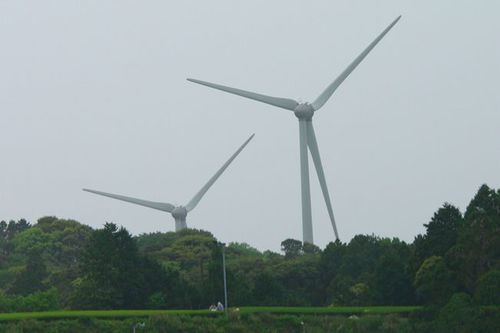August 14, 2015
The Challenges Facing Full-Scale Renewable Energy Development and Expectations of Electricity System Reform (Part 2)
Keywords: Renewable Energy

Image by kontenten Some Rights Reserved.
Part 1 of this article described the current challenges in Japan for expanding the use of renewable energy, an indispensable part of reducing greenhouse gas emissions. It also reported on the expectations for the new Organization for Cross-regional Coordination of Transmission Operators, which started operation in April 2015, as the first step in reforming Japan's power system. In Part 2, the focus is on expectations for the second and third steps of the reforms, which are to be implemented from fiscal 2016 onwards.
In the run-up to the complete deregulation of electricity retailing in Japan to start in 2016, it is necessary to establish a system from the perspective of consumers' rights that gives them the option of choosing their electricity supplier. Discussions are now underway to determine a way to provide information that helps them with that choice. In Europe, for example, consumers are already provided with information on the energy mix of power suppliers that shows what percentage of their electricity comes from renewable energy sources.
Consumers need to know where the electricity from renewable sources is generated, and how it is traded and delivered to them. As for mandatory information, such as the energy mix of power suppliers, consumers should be allowed access to it through their monthly utility bills or the Internet at any time. This will require information disclosure by electricity retailers, as well as transparency of the wholesale electricity market, including information disclosure.
Under Japan's Feed-in Tariff scheme, a method used to calculate "avoidable costs" (the power generation cost that a power company can save by purchasing renewable energy-derived electricity) is important for the transaction of green electricity. The existing method is now under review so that it will be tied in with the market, where the current volume of transactions in the wholesale electricity market accounts for only about one percent of total electricity sold. A stable and longer-term calculation method is required to encourage electricity retailers to handle more renewable energy.
For the third step of the power system reforms (the separation of utilities into electricity generation and transmission operators), it is essential to secure the neutrality of the power transmission and distribution sector. The Expert Committee on the Electricity System Reform, established to develop a basic policy for the power system reform, was initially considering "ownership separation" as the most clear-cut and advantageous form of separation to realize neutrality, fairness, and transparency.
In its final report, released in February 2013, however, the committee postponed the issue of ownership separation for future measures to be taken after results of the reform are assessed, if they are determined to be insufficient. In the amendment of the Electricity Business Act, which was approved in a Cabinet meeting in March 2015 and enacted in the Diet session on June 17, 2015, only "legal separation" is stipulated. Specifically, the power transmission and distribution operators are prohibited from engaging in electricity generation and retailing, and while some regulations on behavior are in place -- such as board members not being allowed to have a concurrent post -- the amended act does not prohibit having capital ties.
In contrast, Europe facilitated an ownership unbundling scheme in 2009 under an EU Directive that has been implemented in many European nations. With efficient operations of powerful regulatory bodies and electricity markets, Europe has achieved complete deregulation of electricity retailing and the large-scale introduction of renewable energy.
The separation of power generation and transmission through a legal unbundling scheme is scheduled for 2020 in Japan. The reason for the process being set for the later schedule may be in consideration of the present situation surrounding existing utilities in Japan. Furthermore, it is important to secure independent status for the electricity and gas transactions monitoring committee, which is to be established as a key regulatory body for ensuring fairness and neutrality of the electricity system. In Germany, for example, the Federal Network Agency (BNetzA) is responsible for regulatory control to maintain market fairness.
Germany's Federal Network Agency, BNetzA
http://www.bmwi.de/EN/Ministry/The-Ministrys-Agencies/federal-network-agency-bnetza.html
In Japan, meanwhile, an electricity and gas transactions monitoring committee is to be set up as an "Article Eight Commission of the Ministry of Economy, Trade and Industry (METI), to undertake the role of transaction monitoring and regulatory control. (An Article Eight Commission is an independent body established within a government ministry based on Article 8 of the National Government Organization Act.) The next challenge is to see how effectively the new structure and authority will function under the reformed electricity system.
Hironao Matsubara
Institute for Sustainable Energy Policies
Related
"JFS Newsletter"
- 'Yumekaze' Wind Turbine Project Connects Metro Consumers and Regional Producers: Seikatsu Club Consumers' Co-operative
- Shaping Japan's Energy toward 2050 Participating in the Round Table for Studying Energy Situations
- Nishiawakura's Initiative for 100% Energy Self-Sufficiency, and a Municipal ICO Scheme
- Actions Toward 100% Renewable Energy in Japan
- Sustainable Community Building in Shimokawa: Recycling-Oriented Forest Management Enabling Permanent Use of Forest Resources
Related
"Popular Articles"
- Current Status of Renewable Energy in Japan (2015)
- Offshore Wind Farm Withstands Great East Japan Earthquake and Tsunami
- Current Status of Renewable Energy in Japan (2014)
- Geothermal Power: Japan Has World's Third Largest Geothermal Reserves, 60 Percent of Which Can Be Developed
- Tokyo Plans to Increase Renewable Energy Ratio to 20% by 2024


